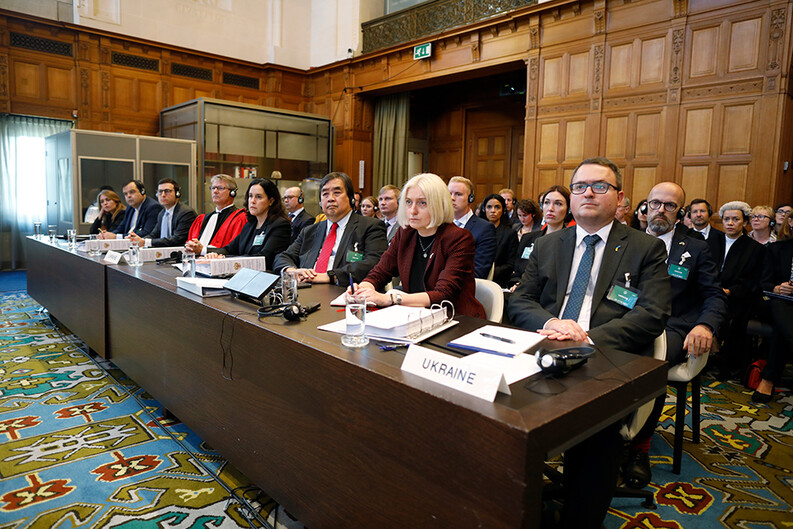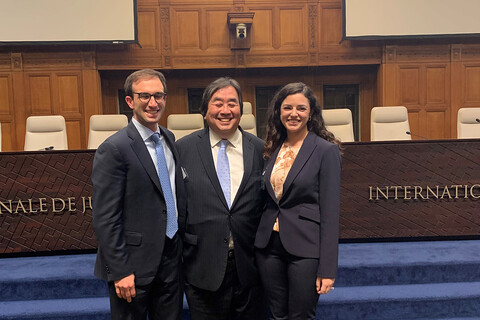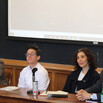Professor Koh Asks International Court of Justice to Decide Ukraine’s Suit Against Russia

Sterling Professor of International Law Harold Hongju Koh, for the third time in the last two years, returned to the International Court of Justice (ICJ) in the Hague this month to argue on behalf of Ukraine against Russia. Koh, former U.S. State Department Legal Adviser and Assistant Secretary of State for Human Rights, presented two arguments on behalf of Ukraine in Court sessions that spanned nearly two weeks.
The September hearings on preliminary objections raised by Russia followed a hearing in March 2022, where Koh presented Ukraine’s closing argument. In that hearing, Ukraine sought preliminary relief against Russia for its legal violations stemming from its 2022 invasion. Koh asked the ICJ to rule on Russia’s allegations that Ukraine was committing genocide against its own people to justify its claim of legal authority to take military action in and against Ukraine.
Koh’s opening argument on Sept. 19 opposed Russia’s preliminary objections moving to dismiss Ukraine’s application for lack of subject matter jurisdiction. By falsely accusing Ukraine of genocide as a pretext for using force to invade its territory, Koh argued, Russia violated its obligations under the U.N. Convention for the Prevention and Punishment of Genocide.
In his initial presentation to the judges, Koh argued: “States offend the object and purpose of the Genocide Convention when they ignore a genocide that is clearly occurring, but also when they falsely allege a genocide that is clearly not occurring — not to achieve the Convention’s humanitarian purposes, but to seek license to illegally attack and invade another State.”
WATCH THE FIRST SESSION: Professor Koh at 21:36
On Sept. 20, 2023, a landmark day in the Court’s history, 32 States who agreed to be bound by the Court’s judgment intervened in support of Ukraine, arguing in unified voice that the dispute before the Court raises a question of “interpretation, application or fulfilment” of the Convention that falls under the Convention’s dispute-settlement clause.
One week later, Koh opened Ukraine’s closing round on Sept. 27, arguing that the sole question before the Court at the jurisdictional stage was “may a powerful State falsely accuse its neighbor of genocide, then use illegal force to kill its citizens, devastate their homeland, and destabilize the global legal order on the pretext of preventing and punishing genocide? “Koh argued that the Court’s decision of that question “will help define the scope of this Court’s power to stop the flagrant abuse of the world’s most important human rights treaty.” A ruling is expected in early 2024.
WATCH THE SECOND SESSION: Professor Koh at 1:21
The ICJ is the United Nations’ court for resolving disputes between nations, established in June 1945 by the Charter of the United Nations and seated at the Peace Palace in The Hague (Netherlands).
Professor Koh has now argued for Ukraine against Russia in three cases. In the second, which addresses Russian abuses from 2014 to the present, Koh argued in June 2023 that Russia violated its obligations under the International Convention for the Suppression of the Finance of Terrorism by its actions in Donetsk and Luhansk and by shooting down Malaysian Airliner MH-17 in 2014 and had violated the U.N.’s International Convention for the Elimination of All Forms of Racial Discrimination by its abusive treatment of ethnic minorities in occupied Crimea. That case is currently awaiting final decision by early 2024, In a third case pending before a Permanent Court of Arbitration panel sitting in the Hague, Koh’s team is challenging Russia’s maritime violations in the Black Sea and the Sea of Azov under the U.N. Convention on the Law of the Sea.

In addition to Koh, Ukraine is represented before the ICJ by a team of litigators from Covington & Burling LLP led by Marney Cheek, Jonathan Gimblett, and David Zionts, which includes recent Yale Law School graduates Paul Strauch ’18 and Gaby Vasquez ’21. They appeared alongside Professor Jean-Marc Thouvenin of Paris-Nanterre University and Ukraine’s Co-Agents before the Court, Anton Korynevych, and Oksana Zolotaryova, Ambassador-at-Large and Director of the International Law Department in the Ministry of Foreign Affairs of Ukraine, respectively.
Koh is the Sterling Professor of International Law at Yale Law School, where he has taught since 1985, and served as Dean from 2004–09. He is one of the nation’s leading experts in public and private international law, national security law, and human rights. From 2009–13, he served as the 22nd Legal Adviser of the U.S. Department of State in the Obama Administration, and in 2021, he returned to the Office of the Legal Adviser at the start of the Biden Administration as Senior Adviser, the senior political appointee in that office. He is the author of many books and articles, most recently, The National Security Constitution in the 21st Century (forthcoming Yale University Press 2024). He has been awarded numerous awards for his human rights work, including most recently, the 2023 Raphael Lemkin Rule of Law Guardian Medal from Duke Law School.


